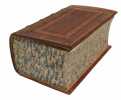TACITUS, CORNELIUS (+) GROTNITZ VON GRODNAU, CARL MELCHIOR (translator).
Des C. Corn. Tacitus Beschreibung 1. Etlicher der ersten romischen Keiser, und anderer denkwurdiger Geschichte (...) 2. Der Teutschen-Volcker Ursprunges, uralten Vaterlandes, Versezungen, Kriege, Sitten und Gebrauche (...) 3. Der Romer, weiland i... - [FIRST COMPLETE GERMAN TRANSLATION OF TACITUS]
Franckfurt, Georg Mullers, 1657. 8vo. In a nice contemporary Cambridge-style mirror binding with four raised bands and richly gilt spine. All edges marbled. Small paper-label pasted on to top of spine. Margin of front board faded. Ex-libris (Carl Juel, Danish statesman and owner of Valdemar's Castle) pasted on to pasted down front end-paper. First 20 ff. with damp stain in upper outer corner, otherwise a nice and clean copy. (34), 1266, (26) pp. + frontispiece.
Reference : 61325
The rare first complete German translation of Tacitus. Tacitus’ texts had a profound influence in Germany, more so than most other classical works. Tacitus’ works influenced German identity and nationalism by providing a romanticized view of ancient Germans, contributing to the development of a distinct cultural identity. Tacitus’s description of ancient Germanic tribes in Germania was idealized by many German intellectuals as depicting noble and pure ancestors. It created a romanticized image of Germanic virtues like bravery, simplicity, and freedom. From the 16th century onward, particularly during the Renaissance and the Romantic era, Germania was used to foster a sense of national pride and distinct identity. It played a role in the rise of German nationalism, especially in the 19th century leading up to the unification of Germany in 1871. In the 20th century - particularly under Nazi rule – ‘Germania’ was misinterpreted and misused to promote ideas of racial purity and Aryan superiority, contributing to the ideology that justified many of the regime's atrocities. “The first printed translation of Tacitus’ texts sees the light in 1535 in Mainz and offer a German version of A.[De vita Iulii Agricolae], the H.[Historiae], and the G.[De origine et situ Germanorum], by Jacob Micyllus. Although German inaugurates the European movements of translations of Tacitus, the initial momentum ceases immidialtely. We must wait until 1612 before a new version of A. and the H. are worked on by Ludwig Kepler. German readers do not gain access to the entirety of the works of Tacitus (without the D.[Dialogus de oratoribus]) until 1657 [the present], thanks to the translation of Carl Melchior Gronitz von Grodnau. For the first time, also the Ag. is translated in this language.” (The Tacitus Encyclopedia). During the 16th and 17th centuries, the works of the Latin historian Caius Cornelius Tacitus, who wrote in the irst century AD, became bestsellers in Europe. From Italy to France, and in England, the Netherlands, the German Empire, and the Spanish monarchy, Tacitus’s Annals, Histories, Life of Agricola, Germania, and even the Dialogue on Orators – which in that period was not consistently attributed to him – became privileged objects of reading. Soon, a wide array of derivative works appeared. Commentaries on the text, discourses based on selected passages, aphorisms, judgments or notes, and virtually any kind of book related to Tacitus’s texts in any possible form found a printer and readers” (Bermejo, Translating Tacitus).
Bookseller's contact details
Herman H. J. Lynge & Son
William Schneider
Silkegade 11
1113 Copenhagen
Denmark
+45 33 155 335
Payment mode
Sale conditions
All items may be returned for a full refund for any reason within 14 days of receipt.
 Write to the booksellers
Write to the booksellers




